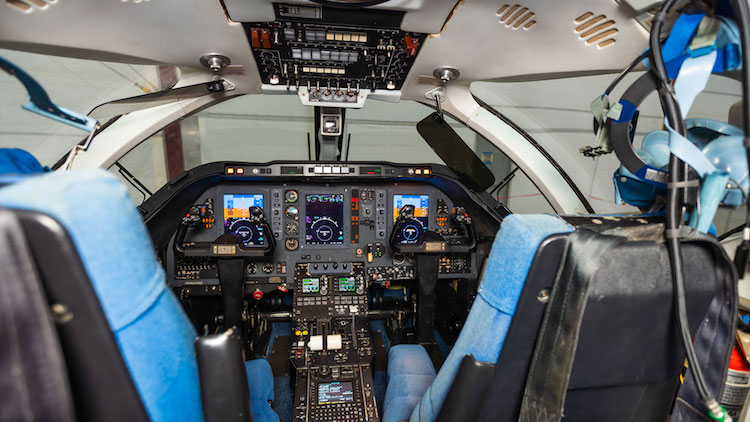
The Pro Line Fusion 21 cockpit of the first upgraded US Air Force T-1A trainer aircraft. Photo: Collins Aerospace
The first U.S. Air Force T-1A Jayhawk upgraded with a Collins Aerospace Pro Line 21 avionics suite recently completed its first successful flight.
Under an Air Force avionics modernization program contract, a fleet of 178 T-1As is being upgraded with Pro Line 21 avionics at Field Aerospace’s installation and training facility in Oklahoma City. The fleet includes a combination of combat system officer and specialized undergraduate pilot training aircraft.
The first T-1A to feature Pro Line 21 completed two check flights.
“These first two flights were a success and a very important step toward providing future USAF aircrew with access to modern avionics for aviation training and simulation,” said Brian Love, chief commercial officer at Field Aerospace.

The first upgraded T-1A taking off. Photo: Field Aerospace
Field was part of a collection of companies, including Collins, Nextant Aerospace and Flight Safety International awarded a $155 million contract in April 2018 to upgrade the T-1As to the Pro Line 21 package. The contract includes the development of 16 operational flight trainers and 14 part task trainers to match the new avionics configuration.
The T-1A Jayhawk is a commercial derivative of the Beechjet/Hawker 400A, which is used to train future pilots of the Air Force’s airlift and tanker aircraft including the KC-135, KC-10, KC-46 and C-130. The Air Force uses the aircraft to train students, instructor pilots and combat systems officers.
Among the major differences between the commercial and military variants of the aircraft are the T-1A’s structural enhancements for increased bird strike resistance and an additional fuselage fuel tank. Upgrades to the fleet include three large liquid crystal displays, data link communications and new transponders to comply with the FAA’s upcoming Jan. 1, 2020 ADS-B Out mandate.
Collins has used a similar upgrade package on an assortment of in-service business jets, including the Challenger 300 and 605 and Hawker 750.
“Achieving this project milestone means we’re one step closer in bringing advanced capabilities to the next generation of U.S. Air Force pilots,” said Dave Schreck, vice president and general manager for military avionics and helicopters at Collins Aerospace.